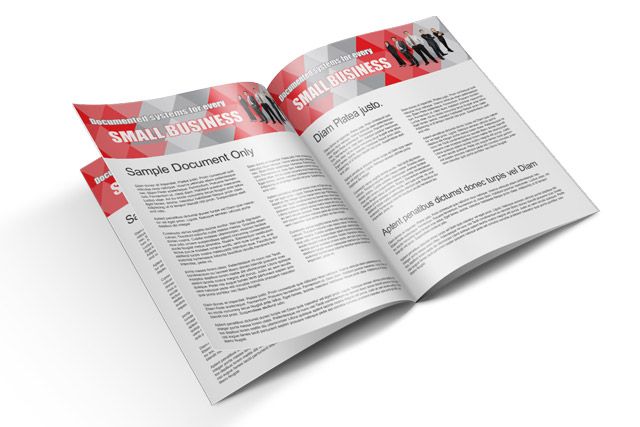
Portfolio Allocations Are Important For Effective Management
Issue 0031
One of the problems many small business operators encounter is that they try to do too much, primarily because they haven’t been able to introduce effective delegation within their organisation. One way to introduce effective delegation is to allocate portfolios that are relevant to your business. My suggestion is sit down, write a list of all of the functions that relate to your organisation and think about how each role could be performed. Even if the activity is only going to take a few minutes each day or 10 minutes a week, it all contributes to the effective management of the business. You need to be careful that you don’t keep all of these activities for yourself. Try and delegate them.
Unfortunately, some business operators do keep all of these types of activities to themselves. Therefore, it’s no wonder that many small/medium enterprise operators get “bogged down” from day-to-day activities without having sufficient time to concentrate on the future.
Chief executive officers of public companies spend approximately 60-80% of their time thinking about and planning future activities, these people have effectively delegated as many day-to-day activities as possible, so they can concentrate on planning and leading their business into the future. Small/medium enterprises are no different. A leader needs to have time to be able to effectively plan. This will not occur, unless the leader delegates as much day-to-day activities as possible, so they have free time to concentrate on future activities.
List of activities to consider
Some of the activities you might think about delegating is to document who is responsible for these activities and then periodically following-up to ensure the person who has been allocated the responsibility is, in fact, performing it. These could be as follows:
- • Premises - Premises Maintenance - Security - Who receives after-hours phone calls if there’s a problem at the premises?
- • Risk Management Monitoring - Risk Strategies Applicable to your Business - Personal Property Securities Register (due diligence review of your business’ potential exposure to risk under the Personal Property Securities Act) - Insurance Cover for Assets, Risks, Humans
- • Suppliers - Ordering of Stock - Receipt of Stock - Stock Control - Negotiations with Suppliers
- • Sales - Who is the sales person(s)? - Who is responsible for local sales? - Does your business undertake export sales? - Who is responsible for export sales? - Training of Sales Team Members
- • Marketing - In-Store Promotions - Sponsorships - Advertising - Social Media - Development and Enactment of the Marketing Plan - Market Research – Australia and International
- • Customers - Customer Database (Customer Relationship Management System) - Customer Advisory Committee - Customer Suggestions and Feedback - Export Customers Requirements * If the business is exporting, who is responsible for the export documentation?
- • Human Resources - Engagement of New Team Members - Induction of New Team Members - Team Training - Team Member Appraisals - Encouragement of Professional Development Activities by Team Members - Social Activities
- • Manufacturing - Product/Service Development - Preparation of Products - Production Supervisor - Production Planning
- • Research and Development - Brainstorming R&D Ideas - Documentation of R&D Activities - Registration with AusIndustry by 30th April the following year - Documentation of Participation in the Development of Intellectual Property - Monitoring of R&D Projects - Preparation of Patent Applications
- • Quality Control - Quality Assurance, Systems and Reviews
- • Corporate Governance - Public Relations for the Business - Company Secretarial Role - Liaison with Legal Advisers - Monitoring of Environmental Issues that affect the Business - Participation with Local Development Association - Participation with Chamber of Commerce/Industry Associations - Awareness of Trade Practices Legislation
- • Financial - Development and Ongoing Monitoring of the Financial System – to ensure accurate financial data is going to be prepared - Preparation of Monthly Management Accounting Reports and Key Performance Indicators - Preparation of Budgets and Cashflow Forecasts - Comparison of Actual Performance to Budgets and Cashflow Forecasts - Weekly or Fortnightly Performance Estimates - Insurance - Debtors - Creditors - Finance - Liaison with the Business’ Bank - Liaison with Lease and Finance Companies - Foreign Currencies – especially if the business is an exporter, an importer or a tourist operator - Benchmarking
- • Internal Control
- • Capital Expenditure
- • Taxation Issues - Business Activity Statement Preparation - Tax Return Preparation
- • Competitors - Monitoring of Competitors - Maintenance of Competitors’ Confidential Files - Evaluation of Business against Competitors
- •Management - Management Team Meetings - Professional Development Training for Management Personnel
- • Shareholders - Communication with Shareholders - Review of Shareholders’ Agreements (if any) – to ensure compliance
- • Commercialisation Strategy - Corporate Systems – that enable your business to perform efficiently - Business Plan Implementation
- • Grant Monitoring – including: - Export Market Development Grant (if exporter) - Research and Development Tax Incentives (if undertaking R&D projects) - Other Government Grants • Government Activities - Liaising and Monitoring Decisions relative to: * Local Government * State and Territory Governments * Federal Government
Accountants can assist
Accountants who are offering business advisory services can assist businesses to delegate portfolio allocations to other members of your team. As a preview to the type of services an accountant/adviser, utilising business advisory services made available by ESS BIZTOOLS, a complimentary copy of ‘Characteristics Of A Well Run Business’ can be downloaded below. If you are interested in any of the work discussed in this article being undertaken, we urge you to have a discussion with your accountant. However, if your accountant is unable to provide you with this type of service, please don’t hesitate to send an email to peter@essbiztools.com.au, with your location and postcode, and we will send you an introduction to an accountant/adviser whom we know will be able to deliver this service for you. If you wish to receive future editions of Survival Hints for Small Business series, you can visit our iTunes – Podcasts - Survival Hints for Small Business page and subscribe to our podcasts. If you have any questions or suggestions on future items to be covered in Survival Hints for Small Business, please don’t hesitate to contact us.
Past Posts
-
 Innovation is Important for SMEs
Innovation is Important for SMEs -
 6 Steps to Boost Your Productivity and Profits
6 Steps to Boost Your Productivity and Profits -
 Tax Incentives For Early Stage Investors
Tax Incentives For Early Stage Investors -
 ESIC Targets SMEs, Inventors, Young Companies
ESIC Targets SMEs, Inventors, Young Companies -
 Early Stage Innovation Company Investor Opportunities
Early Stage Innovation Company Investor Opportunities -
 Will You Have an ESIC Story?
Will You Have an ESIC Story? -
 Are you Receiving a CFO Service from your Accountants?
Are you Receiving a CFO Service from your Accountants? -
 Succession Planning
Succession Planning -
 Business Plans
Business Plans -
 The Year for Business Advisory Services!
The Year for Business Advisory Services! -
 Are you Aware of the PPSR?
Are you Aware of the PPSR? -
 SME Operators – Accountants can Help you with Debtors’ Ma...
SME Operators – Accountants can Help you with Debtors’ Ma... -
 Happy New Financial Year
Happy New Financial Year -
 The Finalisation of the ESIC Legislation will be a Great ...
The Finalisation of the ESIC Legislation will be a Great ... -
 A Business Evaluation Review Can Assist You
A Business Evaluation Review Can Assist You -
 June is a Great Time to Prepare a Business Plan
June is a Great Time to Prepare a Business Plan -
 Businesses Need a Broad Succession Strategy
Businesses Need a Broad Succession Strategy -
 Innovation Companies are a Great Opportunity for SMEs
Innovation Companies are a Great Opportunity for SMEs -
 The PPSR – are you aware of it and how it can affect your...
The PPSR – are you aware of it and how it can affect your... -
 Debtors Management - Vital for Business Success
Debtors Management - Vital for Business Success -
 How can your Accountant assist you?
How can your Accountant assist you? -
 The Personal Property Securities Register – how do you pr...
The Personal Property Securities Register – how do you pr... -
 Legal Advice is Essential for Business Success
Legal Advice is Essential for Business Success -
 Is your accountant your trusted adviser
Is your accountant your trusted adviser -
 Is your accountant famous for adding value?
Is your accountant famous for adding value? -
 Portfolio Allocations Are Important For Effective Management
Portfolio Allocations Are Important For Effective Management -
 The Challenges To Navigate In 2015
The Challenges To Navigate In 2015 -
 Business Plans Are Important For All Businesses
Business Plans Are Important For All Businesses -
 Entrepreneurs’ Infrastructure Program
Entrepreneurs’ Infrastructure Program -
 Digital Disruption Is A Major Concern
Digital Disruption Is A Major Concern -
 Court Case Decisions on the Personal Property Securities ...
Court Case Decisions on the Personal Property Securities ... -
 Personal Property Securities Act Presents Businesses A "T...
Personal Property Securities Act Presents Businesses A "T... -
 Do You Require Additional Financial Services?
Do You Require Additional Financial Services? -
 Personal Property Securities Act – How Does It Affect Sma...
Personal Property Securities Act – How Does It Affect Sma... -
 Business Health Checks For Your Business
Business Health Checks For Your Business -
 Why Do Some Accountants Offer Chief Financial Officer Ser...
Why Do Some Accountants Offer Chief Financial Officer Ser... -
 Getting Assistance From Your Accountant To Better Manage ...
Getting Assistance From Your Accountant To Better Manage ... -
 Identifying The Services You Want To Receive From Your Ac...
Identifying The Services You Want To Receive From Your Ac... -
 What Is Business Advisory Services?
What Is Business Advisory Services? -
 Accountants Can Offer More Services Than Just Tax Returns
Accountants Can Offer More Services Than Just Tax Returns -
 Being Kept In The Loop By Your Accountant
Being Kept In The Loop By Your Accountant -
 Personal Property Securities Register – Have You Develope...
Personal Property Securities Register – Have You Develope... -
 Reducing Debtors' Days Outstanding
Reducing Debtors' Days Outstanding -
 Management of Costs - An Overview
Management of Costs - An Overview -
 Succession Planning - Why Is It Necessary?
Succession Planning - Why Is It Necessary? -
 Safe Guarding your Business under the Personal Property S...
Safe Guarding your Business under the Personal Property S...




































